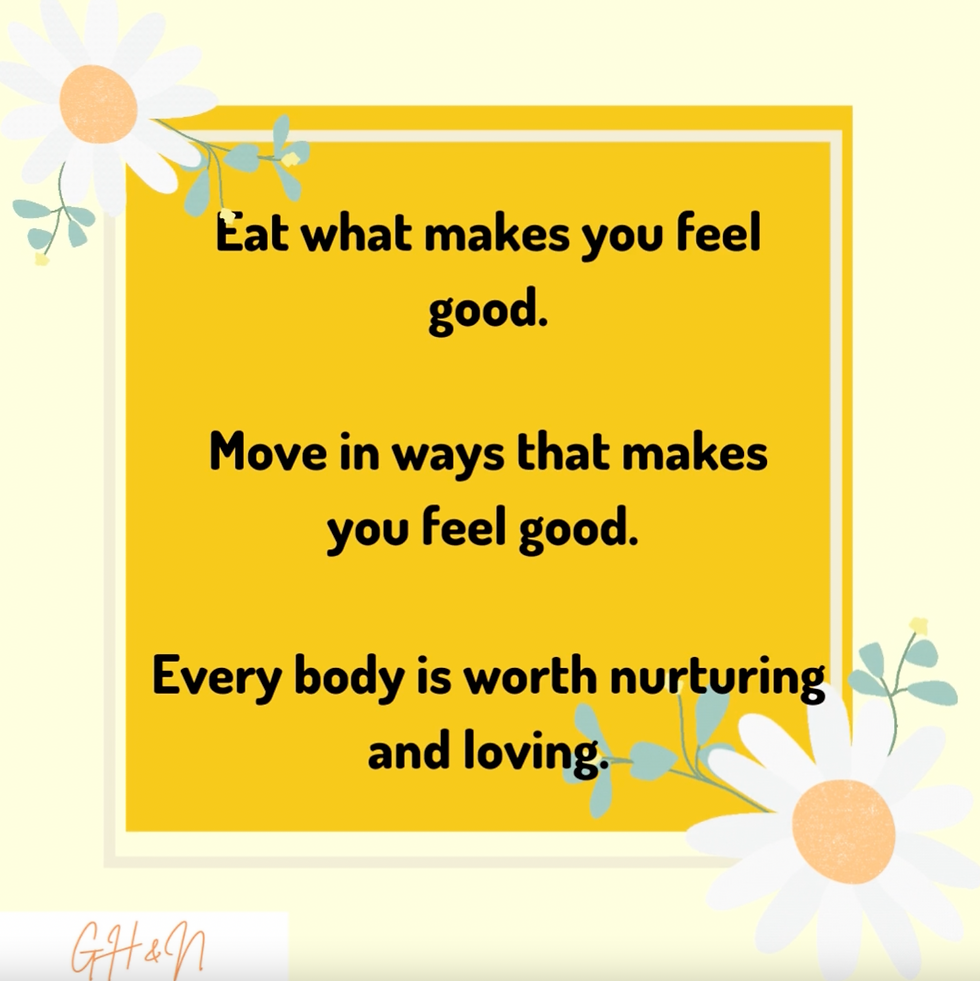There is more to the eye than just seeing a dietitian or any allied health clinician for that matter. The way in which we practice may align better with some individuals more than others, in simple terms, the Health At Every Size (HAES) approach emphasises honouring internal hunger and satiety cues and nourishing ourselves with food that makes us feel good whereas, the Weight-Centric approach emphasises weight loss as the remedy of health issues and following a strict diet from the 5 food groups (Vegetables, fruits, grains, dairy and meat and alternatives). Here I outline what the HAES Approach is.
Principles
Weight Inclusivity - Accepting and respecting the diversity of body sizes and shapes. If we respect them in their true size, this may help them to also accept themselves too.
Health Enhancement - supporting health policies that promotes access to services to improve well-being.
Respectful Care - work to end weight stigma, discrimination and bias. This also provides social support for body acceptance. It seeks to disentangle the prejudice the individual holds towards themself and adherence to social pressures to fit in an ideal aesthetic.
Eating for Well-Being - promote flexible eating based on hunger, satiety, nutritional needs and pleasure. This may also be linked to eating mindfully or intuitive eating.
Life-Enhancing Movement - supports physical activity that allows people of all sizes and abilities to engage.

What does it look like in practice?
Instead of bringing out the scales during consultations to measure weight and ultimately, "health" (I put quotation marks because does someone's weight actually define their overall health?), there are other options to track and record their progress. This includes the hip-to-waist -ratio, circumference of the thighs, arms and calves and timing of their physical activity.
The reason we use the hip-to-waist ratio is that it is a better indicator of detrimental health outcomes. The more fat around our middle/ stomach, the more fat is surrounding our vital organs thus increasing our risk of CVD, diabetes, and heart attacks. The circumference varies in people of all sizes, as some have bigger muscles than others.
HAES looks at many aspects of one's life and does not take weight into account. This is because many other factors can influence one’s weight and overall health and if we address these, weight may be impacted in some way regardless, but is not our main goal. We focus on promoting mindfulness to one’s body by discovering hunger and fullness cues, investigating their relationship with food practices, and who they might eat meals with and where. We look at their sleep patterns, understand their culture, their access to food and consider how their socioeconomic status influences their life. HAES is client centred and has the goal of maintaining an individual’s quality of life through day-to-day activities.
Another reason why weight is not seen as a health determinant in this approach is that each individual has their own genetic makeup, underlying health conditions and different metabolism which may change throughout one's life through certain life stages. Weight loss is not a one-size-fits-all remedy for improving health, there are other individual factors that should be investigated and addressed.
How the HAES Approach can help you
In one study it was found that after 6 months of seeing a HAES-aligned practitioner, there were significant improvements in the:
Disinhibition
Susceptibility to hunger
Intuitive eating
Obsessive-compulsive eating
Appearance
Self-esteem
Depression
Blood lipids
Blood pressure
As you can see, there are more improvements emotionally, mentally and physiologically with this approach. After all, health is more than just looking "healthy", it is about feeling and thinking healthily too.

Do you feel like this blog has resonated with you? Want to know how to become more mindful in your everyday life? That's what I'm here for! Book a consultation with me to start living and happier and healthier life now!

Comments